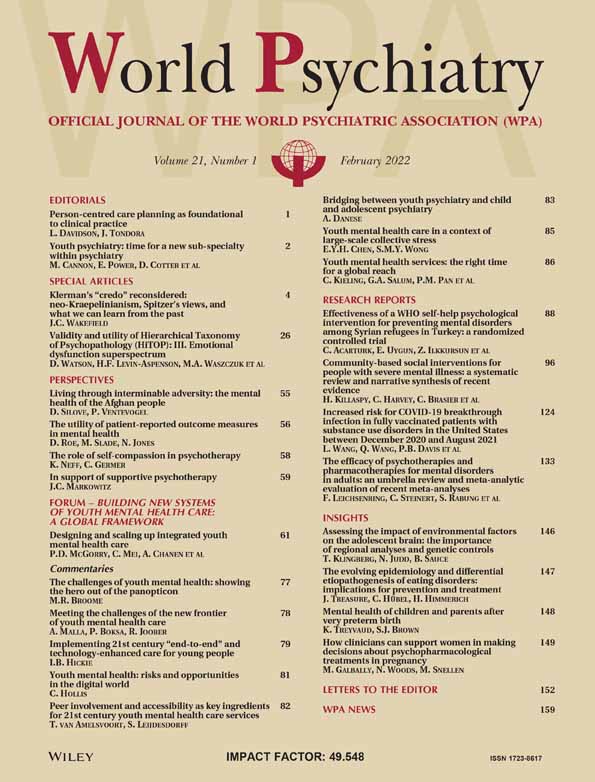根据DSM-5修订标准的人格障碍替代模型(AMPD)的效度、信度和临床应用。
IF 65.8
1区 医学
Q1 Medicine
引用次数: 0
摘要
自DSM-5中的人格障碍替代模型(AMPD)出版以来,在过去的12年中积累了大量的经验证据。到目前为止,这些证据还没有按照美国精神病学协会(APA)提出的修订DSM-5的建议所要求的标准进行组织和报告。这些标准是基于Kendler-Kupfer更新和扩展的经典罗宾斯-古兹标准,以建立精神病学诊断的有效性。美国心理学会邀请我们对过去十年的AMPD研究进行回顾,并根据这一证据提出一个修正的、简化的模型。在这里,我们提出了审查的结果和我们对模型修订的建议。我们首先简要地重申了AMPD的背景和基本原理,然后描述了APA要求的修订标准。然后,我们使用所需的框架总结支持AMPD的证据。我们的回顾表明,ampd定义的人格障碍(PD)在前事、并发和预测验证器方面显示出与分类PD诊断相似的关联模式。在AMPD定义的PD和分类诊断之间的直接比较表明,AMPD对人格病理的描述更精确。此外,ampd定义的PD似乎显示出比分类PD更高的可靠性估计,并且具有很强的临床实用性,通常优于分类PD诊断。我们的结论是,AMPD已准备好纳入DSM的主要部分。提出了以下建议:a)根据过去十年积累的证据进一步精简AMPD, b)在证据缺乏或更有限的领域的未来研究方向。本文章由计算机程序翻译,如有差异,请以英文原文为准。
The validity, reliability and clinical utility of the Alternative DSM-5 Model for Personality Disorders (AMPD) according to DSM-5 revision criteria.
A substantial body of empirical evidence has accumulated over the last 12 years since the publication of the Alternative Model for Personality Disorders (AMPD) in the DSM-5. As yet, this evidence has not been organized and reported using the criteria required by the American Psychiatric Association (APA) for proposals submitted to revise the DSM-5. These criteria are based on the Kendler-Kupfer update and expansion of the classic Robins-Guze criteria for establishing psychiatric diagnostic validity. We have been invited by the APA to undertake a review of the last decade of research on the AMPD and to propose a revised, simplified version of the model informed by this evidence. Here we present the findings of the review and our recommendations for the revision of the model. We begin with a brief reiteration of the background and rationale for the AMPD, followed by a description of the revision criteria required by the APA. We then summarize the evidence in support of the AMPD using the required framework. Our review indicates that AMPD-defined personality disorder (PD) shows similar patterns of associations as have been demonstrated for categorical PD diagnoses in terms of antecedent, concurrent and predictive validators. Head-to-head comparisons between AMPD-defined PD and categorical diagnoses suggest a more precise characterization of personality pathology by the AMPD. In addition, AMPD-defined PD appears to show higher reliability estimates than categorical PDs, and strong clinical utility, often outperforming categorical PD diagnoses. We conclude that the AMPD is ready for inclusion in the main section of the DSM. Recommendations are made for: a) further streamlining the AMPD in light of the last decade of accumulated evidence, and b) future research directions in areas where evidence is lacking or more limited.
求助全文
通过发布文献求助,成功后即可免费获取论文全文。
去求助
来源期刊

World Psychiatry
Nursing-Psychiatric Mental Health
CiteScore
64.10
自引率
7.40%
发文量
124
期刊介绍:
World Psychiatry is the official journal of the World Psychiatric Association. It aims to disseminate information on significant clinical, service, and research developments in the mental health field.
World Psychiatry is published three times per year and is sent free of charge to psychiatrists.The recipient psychiatrists' names and addresses are provided by WPA member societies and sections.The language used in the journal is designed to be understandable by the majority of mental health professionals worldwide.
 求助内容:
求助内容: 应助结果提醒方式:
应助结果提醒方式:


